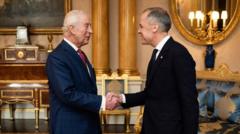The invitation signals a notable shift in Canada’s relationship with the monarchy, contrasting the era of former Prime Minister Stephen Harper, who sought to emphasize Canada’s royal connections amid national debates on independence. Under Harper, actions like replacing local artworks with portraits of the Queen elicited controversy and were seen as out of touch with modern Canadian identity. However, the political landscape has since evolved, particularly with the Liberal leadership of Justin Trudeau, who marked a departure by re-emphasizing Canadian cultural icons.
Now, under Carney, the forthcoming visit signifies a renewed embrace of royal authority—an affirmation of Canada's distinct tradition as separate from its southern neighbor. Royal historians emphasize that the invitation is not only ceremonial but also a deliberate act designed to reinforce Canada’s unique position amid rising skepticism toward American influence.
As Canada grapples with historical and contemporary challenges around national identity and sovereignty, King Charles’s imminent visit and the accompanying throne speech are anticipated to symbolize reconciliation and the importance of tradition in a rapidly changing political landscape. Observers speculate that this visit, scheduled for Monday, could become a touchstone in Canada’s diplomacy, enhancing ties with Europe while reaffirming its ambiguity toward the U.S.
Furthermore, the visit carries significance for the monarchy itself, being the King’s first official trip to Canada as reigning monarch, a move greeted with both intrigue and scrutiny regarding its implications for relationships with indigenous populations and the broader public sentiment toward the Crown.
Overall, Carney's invitation marks a pivotal reinvigoration of the relationship between Canada and the monarchy, underscoring a commitment to sovereignty and tradition deserving of attention on the global stage.
Now, under Carney, the forthcoming visit signifies a renewed embrace of royal authority—an affirmation of Canada's distinct tradition as separate from its southern neighbor. Royal historians emphasize that the invitation is not only ceremonial but also a deliberate act designed to reinforce Canada’s unique position amid rising skepticism toward American influence.
As Canada grapples with historical and contemporary challenges around national identity and sovereignty, King Charles’s imminent visit and the accompanying throne speech are anticipated to symbolize reconciliation and the importance of tradition in a rapidly changing political landscape. Observers speculate that this visit, scheduled for Monday, could become a touchstone in Canada’s diplomacy, enhancing ties with Europe while reaffirming its ambiguity toward the U.S.
Furthermore, the visit carries significance for the monarchy itself, being the King’s first official trip to Canada as reigning monarch, a move greeted with both intrigue and scrutiny regarding its implications for relationships with indigenous populations and the broader public sentiment toward the Crown.
Overall, Carney's invitation marks a pivotal reinvigoration of the relationship between Canada and the monarchy, underscoring a commitment to sovereignty and tradition deserving of attention on the global stage.

















